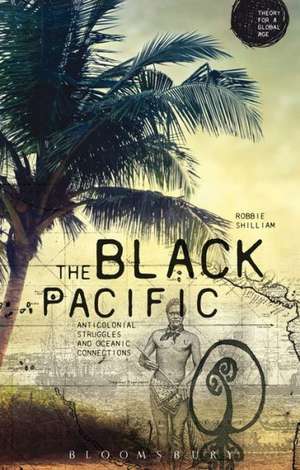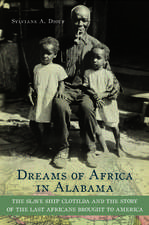The Black Pacific: Anti-Colonial Struggles and Oceanic Connections: Theory for a Global Age Series
Autor Robbie Shilliamen Limba Engleză Paperback – 25 feb 2015
| Toate formatele și edițiile | Preț | Express |
|---|---|---|
| Paperback (1) | 178.65 lei 43-57 zile | |
| Bloomsbury Publishing – 25 feb 2015 | 178.65 lei 43-57 zile | |
| Hardback (1) | 714.12 lei 43-57 zile | |
| Bloomsbury Publishing – 25 feb 2015 | 714.12 lei 43-57 zile |
Preț: 178.65 lei
Preț vechi: 207.00 lei
-14% Nou
Puncte Express: 268
Preț estimativ în valută:
34.19€ • 35.78$ • 28.45£
34.19€ • 35.78$ • 28.45£
Carte tipărită la comandă
Livrare economică 31 martie-14 aprilie
Preluare comenzi: 021 569.72.76
Specificații
ISBN-13: 9781472535542
ISBN-10: 1472535545
Pagini: 264
Ilustrații: 1 halftone
Dimensiuni: 138 x 216 x 23 mm
Greutate: 0.34 kg
Editura: Bloomsbury Publishing
Colecția Bloomsbury Academic
Seria Theory for a Global Age Series
Locul publicării:London, United Kingdom
ISBN-10: 1472535545
Pagini: 264
Ilustrații: 1 halftone
Dimensiuni: 138 x 216 x 23 mm
Greutate: 0.34 kg
Editura: Bloomsbury Publishing
Colecția Bloomsbury Academic
Seria Theory for a Global Age Series
Locul publicării:London, United Kingdom
Caracteristici
Reveals relationships between parts of the world that have remained resolutely disconnected from one another
Notă biografică
Robbie Shilliam is Senior Lecturer in International Relations at Queen Mary, University of London, UK.
Cuprins
Introduction; Ki te Ao Marama; Prophecy and Signs; At the Crossroads; Weaving the Struggles; Redemption Soon Come; Bibliography; Index.
Recenzii
Shilliam writes with the precision of a historian, chronicling key players' activities and historical events ... Through detailed, historicized descriptions and narratives of Maori activism, and Shilliam's own insightful analysis connecting Black Power with Maori mana motuhake in Black peoples' and the Pacific's shared struggles against colonialism, the reader finds a nuanced history and accounts of a universal struggle for self-determination that has brought Maori placement forward in New Zealand's society today.
Black Pacific aims to decolonize the subaltern not only from the imperial center but also other subalterns. In this way, Shilliam identifies the logical next step after anti-colonial politics: that is, decolonial science.
The Black Pacific is a life changing work of love. Shilliam makes a brilliant contribution to scholarship while still appealing to a more general audience. Constructing an amazing archive of texts and story telling of Maori and Pasifika peoples and practices, he articulates a decolonial science as an approach of repairing colonial wounds. By affirming the knowledge and living traditions of Maori and Pasifika, Shilliam shows their embeddedness in particular locales and their simultaneous connection with each other and proffering of general principles of engagement without laying claim to abstracted universals. If you haven't read The Black Pacific yet, drop everything, and read it now!
This is a creative and important contribution to the study of decolonial world politics and a solid exploration of the spiritual hinterlands where Black Power meets Maori struggles. The poetic dimension of the narrative contributes to an energizing reading experience.
The Black Pacific will change the way we think of colonial science and resistance to its historical projects. This exquisite book is decolonial thought at its finest. An exceptional achievement.
Black Pacific aims to decolonize the subaltern not only from the imperial center but also other subalterns. In this way, Shilliam identifies the logical next step after anti-colonial politics: that is, decolonial science.
The Black Pacific is a life changing work of love. Shilliam makes a brilliant contribution to scholarship while still appealing to a more general audience. Constructing an amazing archive of texts and story telling of Maori and Pasifika peoples and practices, he articulates a decolonial science as an approach of repairing colonial wounds. By affirming the knowledge and living traditions of Maori and Pasifika, Shilliam shows their embeddedness in particular locales and their simultaneous connection with each other and proffering of general principles of engagement without laying claim to abstracted universals. If you haven't read The Black Pacific yet, drop everything, and read it now!
This is a creative and important contribution to the study of decolonial world politics and a solid exploration of the spiritual hinterlands where Black Power meets Maori struggles. The poetic dimension of the narrative contributes to an energizing reading experience.
The Black Pacific will change the way we think of colonial science and resistance to its historical projects. This exquisite book is decolonial thought at its finest. An exceptional achievement.























